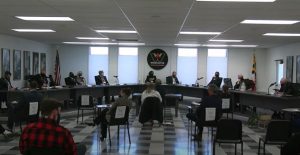
SNOW HILL – School board members reviewed policies on library books this week after concerns were shared regarding sexual context in a book available at local high schools.
On Tuesday, Pocomoke City resident Matt Lankford presented the Worcester County Board of Education with sexually explicit passages from the book “All Boys Aren’t Blue,” which he said was available in media centers at the county’s high schools. Staff explained that library books were reviewed and that there were policies in place to address concerns when they came up. Jennifer Sills, the school system’s coordinator of science and library media, stressed the importance of diverse titles on the shelves.
“Books, they’re both mirrors and windows,” Sills said. “You can go and find yourself, find something that relates to your own world and feel validated but they also allow you to see other perspectives. We try to ensure that we have books on our shelves in all of our libraries where every child in our schools can find themselves and see themselves and learn who they are and who others are.”
During the public comment portion of Tuesday’s meeting, Lankford and two others brought up the issue of library books. Showell Elementary School parent Nathan Diesel told the board he and several other parents had concerns about “All Boys Aren’t Blue” as well as an interest in knowing more about what was being taught in schools. He said much of what they’re heard was hearsay.
“The concern is some of that material includes language that is base and coarse and imprecise, some may consider vulgar,” he said. “These would be the things that I and parents such as myself would be asking, that any material in terms of sex education, perhaps some of these English courses dealing with sexuality and gender issues, that full syllabuses would be made available to parents possibly even lesson plans, full lists of required or recommended reading.”
Christina Hulslander, who has two kids in high school, said she’d read a book Lankford had shared concerns about previously, “All American Boys.” She acknowledged that there was profanity in it but said it was a profound book that included dialogue about real issues.
“Thirty-five percent of our students in Worcester County are non-white,” she said. “Their experiences matter. Every single child in this system matters. This book is a really good one for dialogue about the complexity of going through the human experience… I think it’s important for us as we make criticisms to pay attention and read and be critical thinkers. Because that is our goal with educating kids, to make them critical thinkers. Let’s model that ourselves.”
Lankford told the board he was part of a group interested in exposing the truth.
“What we do is shine our light and expose what is in the dark so others can see what is true,” he said.
Lankford shared audio recordings of several explicit passages — describing the author’s sexual encounters as a young teenager — from “All Boys Aren’t Blue.” The book, by George M. Johnson, is described on its cover as the author’s “memories of growing up Black and queer in America.”
Lankford said that all the county’s teachers should be required to make public the books and supplemental materials they had students reading. He said that should be on the school system’s website.
“Now that would be transparency,” he said.
Following Lankford’s presentation, school board member Todd Ferrante asked Sills to talk about how books were selected for school libraries. She explained that librarians were trained, certified professionals who chose books after reviewing national recommendations as well as county policies and procedures. She said she and school principals reviewed lists of books being purchased.
When asked if she’d received complains regarding “All Boys Aren’t Blue,” Sills said she had not.
“I haven’t had any direct calls to me and none of my librarians have reported that they’ve had any parent complaints,” she said.
When books are questioned by parents or community members, she said librarians and principals meet with them to hear complaints.
“During their discussion, if the person decided they did want to pursue the matter and make it more formal we have a review form, a review request form, the person would fill out,” Sills said. “They’d leave that with the principal. At that time the principal would be responsible for moving forward and takin care of that in the way they saw fit.”
If the issue is not resolved, it comes to her office and from there can go to the superintendent and eventually the school board. She said she was only aware of a couple of situations regarding book concerns in her time with the school system.
She said books in school libraries were on the shelves for voluntary check out.
“So that book that was in question today, it’s purely elective?” board member Bill Gordy said.
Sills indicated that it was not in any curriculum as far as she knew.
“It’s on our shelves for our students who do feel a need to read a book that speaks to them,” she said.
Sills, who said she hadn’t yet read “All Boys Aren’t Blue,” pointed out that it was a memoir that had gotten positive reviews.
“Those passages that were referenced earlier, it’s probably a book that’s well over 300 pages and you’re talking about passages that come from two chapters of the entire book,” she said. “We have to look at them within context as we do with any literary work.”

